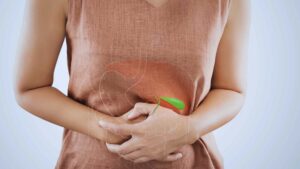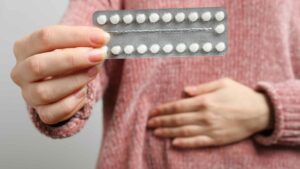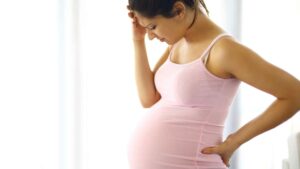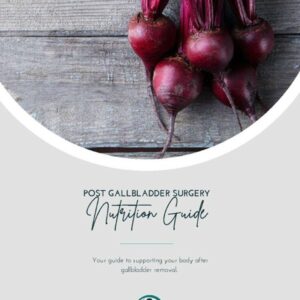How Oral Contraceptives and Female Hormones Increase the Risk of Gallbladder Disease Gallbladder Disease and What You Need to Know

As women, we have so much going on in our bodies as it relates to hormone health.
So understanding how to work with our hormones and do all we can to prevent health complications down the road is a must.
As a gallbladder-focused nutritionist, I need to tell you about how female hormone health can lead to the formation of gallstones, and gallbladder disease.
Unfortunately for us, women are two to three times more likely to develop cholesterol gallstones than men.1
We usually see an increased likelihood in women of childbearing age.
Pregnancy can also be a risk factor for the development of gallstones due to the increase in estrogen levels at this time.
The prominence of gallstone formation in women vs. men is largely due to the female sex hormones– estrogen and progesterone.
- Estrogen increases cholesterol production in the liver, increasing cholesterol in the bile– which thickens bile and can lead to gallstones
- Meanwhile, progesterone slows gallbladder motility which affects the proper flow of bile– increasing the risk of gallstone formation.2
Because the risk of gallstones correlates with the female sex hormones, it makes sense that things like oral contraceptives, pregnancy, and hormone replacement therapy in postmenopausal women are associated with an increased risk of gallstone disease.1
Let’s first cover the basics of gallbladder disease. Then we’ll discover why women are at a greater risk of developing problems with their gallbladders. And most importantly– what we can do to prevent this risk of gallstones.
What Are the Symptoms of Gallbladder Disease?
With gallbladder disease comes gallstones. Gallstones are hard deposits of bile formed in the gallbladder. They range in size from a grain of sand to a golf ball. Most gallstones don’t show symptoms. However, if they move to block the bile duct, bile builds up leading to a gallbladder attack.
Symptoms of a gallbladder attack include: 
- Intermittent or constant pain in the upper right abdomen
- Nausea and vomiting
- Jaundice (yellow of the skin and whites of the eyes)
- Fever or chills
- Chalky stools
- Dark tea-colored urine
Gallbladder attacks are difficult and painful to deal with, so we want to do all we can to prevent them from happening.
If you’re someone who has experienced a gallbladder attack before, I’m here for you. And I want to give you all the understanding and tools you’ll need to best prevent attacks from happening again.
It’s essential to understand how estrogen enhances the risk of gallstone disease. So managing our estrogen levels and supporting estrogen metabolism can decrease this risk drastically.
How Do Oral Contraceptives Impact Gallbladder Health?
Oral contraceptives are the leading method of birth control among women worldwide. About 100 million women are on hormonal birth control to prevent pregnancies.4
Younger women taking oral contraceptives are at higher risk for developing gallstones because of birth control’s estrogen content. Some newer low-estrogen contraceptive pills may not have the same effect. But it’s still important to recognize what a large risk factor oral contraceptives are for gallbladder issues.
Hormones affect the health of our gallbladder. So altering our hormones with birth control can lead to gallstone development.
Let’s look at some stats from a study on fertile women taking oral contraceptives, and the prevalence of gallstones among them

- In the 21-30 year age group:
- Gallstone presence with contraceptives= 39% vs. without contraceptives= 14%
- In the 31-40 year age group:
- Gallstone presence with contraceptives= 40% vs. without contraceptives= 18%
There’s evidence that a higher incidence of gallstones is found in younger women taking birth control than without birth control.
Additionally, a meta-analysis that gathered information from multiple studies states there’s a 36% increase in developing gallbladder disease for women on oral contraceptives compared to those who are not on a hormonal birth control pill..4
So, there’s no question oral contraceptives can lead to gallstone formation. If you’re someone who takes birth control, and especially someone on the pill with gallbladder issues, seeking guidance on an alternative birth control method can save you from painful gallbladder attacks or gallstones.
Why Is There an Increased Risk of Gallstones in Pregnancy?

As we know, estrogen can lead to the development of gallbladder issues. The female body goes through a magnitude of hormonal changes when pregnant, so pregnancy also is a common precursor for developing gallstone disease.
Pregnancy is a risk factor for developing biliary sludge because as estrogen levels increase, the amount of biliary cholesterol increases.
This makes the bile highly saturated and can affect the gallbladder’s motility. These changes lead to increased biliary sludge and gallstones.
Biliary sludge appears in 5% to 30% of pregnant women. 5
This problem usually resolves in the postpartum period, but gallstones do end up developing in about 5% of postpartum women.
Being pregnant already comes with a handful of things to monitor, and some uncomfortable changes. So let’s try to nourish our body and protect it to avoid gallbladder issues through and after pregnancy.
We’ll discuss ways to fuel our bodies to decrease the risk of gallstone disease later on.
Estrogen, Estrogen Dominance, and Gallbladder Health
Estrogen is a female sex hormone, whereas testosterone is a male sex hormone. Although both males and females have estrogen, it’s naturally higher in females.
Estrogen and progesterone work together to regulate the menstrual cycle and help prevent the uterus lining from getting too thick.7 However, too much estrogen can be a bad thing.
Hormonal imbalances affect our overall health. And we’ve learned with high levels of estrogen comes a risk of developing gallstones.
Estrogen dominance is when our body has too much estrogen in relation to the hormone progesterone.
Symptoms of estrogen dominance are: 
- Increased breast tissue density
- Worsening PMS and irregular periods
- Mood swings
- Hair loss
- Bloating
- Anxiety and mood disorders
- Weight gain
- Fatigue
- Brain fog or memory issues
- Low sex drive
If you’re experiencing a combination of these symptoms, consider getting your hormones tested. And if you want even more information on estrogen dominance and gallbladder disease, check out my blog which goes in-depth into this relationship.
When estrogen levels are high, the risk for gallstone formation increases. Many women who experience estrogen dominance have to deal with gallbladder disease.
But– there are ways we can promote the metabolization of estrogen to reduce estrogen dominance, therefore reducing the risk of gallstone disease.
What Women Can Do To Prevent Gallbladder Disease
As women, we need to be aware of how our hormones can lead to different diseases. And the best way we can work to avoid this from happening is to make healthy choices for our bodies.
Diet and lifestyle adjustments set us up for success in all areas, but especially in the prevention of gallstones or gallbladder disease.
Let’s now discuss a few ways we can decrease the risk of gallstones by reducing the amount of excess estrogen in our bodies.
Consider Alternative Birth Control Methods
Today, we have lots of solutions for avoiding hormone-based birth control pills. It’s best to talk to your doctor about what options are best for you.
The most common alternatives to oral contraceptives include IUDs–or intrauterine devices, birth control patches or injections, diaphragms, or condoms.
One of the healthiest and least invasive ways to prevent pregnancy is to track your cycle.
Track and document your menstrual cycle and monitor your basal body temperature to determine when ovulation happens. During ovulation, choose a barrier method or avoid sex to decrease the chances of pregnancy.
Although this isn’t 100% effective in preventing pregnancy, it is the method that exposes your body to the least amount of added hormones.
Support Estrogen Metabolism
Estrogen metabolism can be best supported through diet and lifestyle changes. Here are some ways I recommend supporting the estrogen levels in your body.
- Eat your greens!
- Cruciferous vegetables like kale, broccoli, and brussel sprouts have nutrients that help metabolize estrogen for excretion.
- Don’t skip on fibers
- Fibers can bind to estrogen to promote excretion, so consume a variety of fibers each day. My favorites are fruits, vegetables, nuts, and seeds.
- Maintain a healthy weight
- Excess body fat can increase estrogen and cause issues with metabolizing estrogen. A healthy and balanced diet plus exercise can help support estrogen metabolism.
- Limit stressors
- Increased stress promotes cortisol release which can impact other hormones like estrogen. Try morning routines, going for walks, or peaceful meditation to reduce feelings of stress.
For more detailed recommendations on metabolizing estrogen, check out my blog on estrogen dominance.
The bottom line is female hormones impact gallbladder health. So as women, we need to recognize this and start doing everything we can to support our bodies and decrease the risk of developing gallbladder disease.
If you’ve already experienced symptoms of gallbladder disease, I’m inviting you to join me in integrative nutrition counseling where I work one-on-one with YOU to get to the root of your gallbladder issues. And to prevent gallbladder attacks from arising!
We’ll focus on exactly what may be causing your gallbladder problems. And I’ll develop a detailed nutrition and lifestyle plan to best support you. Whether your symptoms are due to oral contraceptive use, estrogen dominance, or any other risk factor– I’m here to support you!
As a functional nutritionist, I’ve helped tons of people live their best lives while managing gallbladder disease. So if you’re ready to get started promoting your health and quality of life, connect with me today!
Let’s focus on the amazing attributes we have as women. It’s time to work with our bodies and our hormones to prevent disease and live our healthiest lives! Let’s get started together.
References
Novacek G. Gender and gallstone disease. Wien Med Wochenschr. 2006;156(19-20):527-533. doi:10.1007/s10354-006-0346-x
Wang HH, Liu M, Clegg DJ, Portincasa P, Wang DQH. New insights into the molecular mechanisms underlying effects of estrogen on cholesterol gallstone formation. Biochim Biophys Acta. 2009;1791(11):1037-1047. doi:10.1016/j.bbalip.2009.06.006
Symptoms & causes of gallstones. National Institute of Diabetes and Digestive and Kidney Diseases. Published August 30, 2022. Accessed December 8, 2022. https://www.niddk.nih.gov/health-information/digestive-diseases/gallstones/symptoms-causes
Etminan M, Delaney JAC, Bressler B, Brophy JM. Oral contraceptives and the risk of gallbladder disease: a comparative safety study. CMAJ. 2011;183(8):899-904. doi:10.1503/cmaj.110161
Stinton LM, Shaffer EA. Epidemiology of gallbladder disease: cholelithiasis and cancer. Gut Liver. 2012;6(2):172-187. doi:10.5009/gnl.2012.6.2.172
Khan MK, Jalil MA, Khan MS. Oral contraceptives in gallstone diseases. Mymensingh Med J. 2007;16(2 Suppl):S40-45.
High estrogen. Cleveland Clinic. Accessed December 8, 2022. https://my.clevelandclinic.org/health/diseases/22363-high-estrogen

